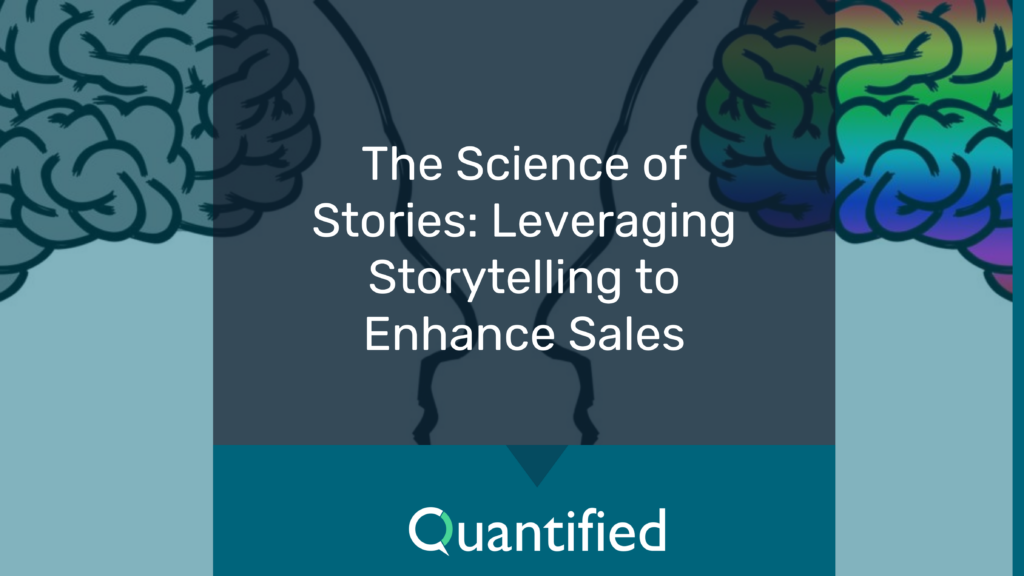The Science of Stories: Leveraging Storytelling to Enhance Sales

The Power of Storytelling in Sales
When was the last time you got lost in a story? Whether in a book, podcast, or movie, a well-told story has a powerful impact on its audience. When messages delivered as stories can be up to 22 times more memorable than mere facts. Stories engage multiple parts of our brains, enhancing focus and retention. Why wouldn’t we want to harness storytelling in sales to make us that more memorable?
Your Brain on Stories
- Neurological Engagement: Stories activate multiple brain areas, including motor cortexes, emotion, and visual processing centers, making the experience immersive and memorable. Research shows that when we listen to a story, our brains simulate the events described, creating a vivid mental image and emotional response.
- Chemical Connection: Stories trigger the release of oxytocin, the bonding hormone, fostering empathy and emotional connections with characters and experiences, which aids memory retention. This chemical reaction is similar to what we experience in real-life social interactions, making the narrative feel personal and engaging.
The Sales Advantage of Storytelling
- Success Stories: Share how your product solved specific problems for clients. For example, a sales rep might explain how a particular software saved a company thousands of dollars. These narratives highlight real-life applications and tangible benefits, making the product’s value clear and relatable.
- Case Studies: Use detailed real-world applications to demonstrate product effectiveness. For instance, a case study showing how a new CRM system improved a sales team’s efficiency by 30%. Detailed case studies provide in-depth analysis and credible evidence of your product’s impact, addressing potential customer concerns and objections.
- Customer Testimonials: Provide authentic customer experiences to build trust. For example, a customer explaining how your product improved their workflow. Testimonials offer social proof and humanize your brand, showing prospects that others have successfully used and benefited from your product.
Recent Data & Trends:
- Search Engine Watch: Storytelling can increase a product’s perceived value by 30%.
- The Brand Shop: 55% of consumers are more likely to remember a story than a list of facts
- Dock: Increase your win rate by 70% and boost sales by over 185%
Implementing Storytelling in Various Sales Scenarios
- Financial Presentations: Transform dull financial data into stories that highlight key insights and impacts. For example, rather than presenting raw numbers, tell a story about the financial journey of the company over the last quarter, highlighting challenges and triumphs. This approach not only makes the data more engaging but also provides context and relevance.
- Quarterly Reports: Introduce team members who made significant contributions and share the stories behind their achievements, humanizing the data and motivating employees. Highlighting individual efforts and success stories can foster a sense of pride and teamwork within your organization.
- Product Demos: Tell stories about how your product has made a difference in real customers’ lives. For example, during a product demo, share a narrative about how your product helped a specific client overcome a major challenge. This technique helps potential customers visualize the benefits and applications of your product in their own contexts.
- Sales Training: Use storytelling to train sales teams. Share success stories and cautionary tales to illustrate best practices and common pitfalls, making training sessions more engaging and memorable. This method can enhance learning outcomes and improve the practical skills of your salesforce.
- Customer Interactions: Weave stories about other customers’ successes into sales calls or meetings, helping prospects see real-world benefits and building trust. Personal anecdotes and success stories can create a stronger emotional connection and make your sales pitch more compelling.
Crafting Effective Sales Stories
- Identify Core Messages: Align stories with your sales goals. What do you want the prospect to take away from your story? Ensure that each story has a clear objective and reinforces your key selling points.
- Know Your Audience: Tailor stories to the interests and needs of your audience. What are their pain points, and how can your product address them? Understanding your audience allows you to create relevant and resonant narratives.
- Build a Narrative Arc: Even short sales stories should have a beginning, middle, and end. Start with a challenge, introduce the solution (your product), and end with the positive outcome. This structure helps maintain interest and provides a logical flow.
- Use Relatable Characters: People relate to people. Use characters (real or hypothetical) that your audience can identify with. Relatable characters make your stories more engaging and credible.
- Be Authentic: Authenticity builds trust. Share genuine stories and avoid exaggeration. Honesty and transparency in your storytelling can enhance your brand’s credibility and foster long-term customer relationships.
- Incorporate Data: Blend storytelling with data to strengthen your narrative. For example, share a story about a customer who saw a 50% increase in efficiency after using your product. Combining qualitative and quantitative information can make your stories more persuasive and impactful.
Using AI for Enhanced Storytelling
- Personalized Narratives: AI helps craft personalized stories based on customer data. By analyzing customer behaviors and preferences, AI can generate tailored narratives that resonate more deeply with individual prospects.
- Data-Driven Insights: Leverage AI to highlight key insights within compelling stories. AI can identify patterns and trends that might be overlooked, providing valuable content for your sales stories.
- Performance Metrics: Use AI to measure the impact of storytelling on sales performance. By tracking engagement and conversion rates, AI can help you refine your storytelling strategies for maximum effectiveness.
- Practice with AI: AI Simulation can offer opportunities to practice your storytelling skills with practice simulations and give you instant coaching that helps you confidently pursue storytelling with your prospects.
Digital Storytelling Strategies
- Social Media: Share engaging customer stories and company milestones. Use platforms like LinkedIn, Twitter, and Instagram. Social media provides a broad reach and can amplify your storytelling efforts, engaging a larger audience.
- Videos: Create video testimonials, case studies, and product demos that tell a story. Videos are highly engaging and can convey complex information quickly and effectively.
- Webinars: Host narrative-driven sessions on industry topics or specific products. Webinars offer an interactive platform for storytelling, allowing real-time engagement with your audience.
- Blogs: Write articles about industry trends, customer successes, and company updates. Blogs provide a space for in-depth storytelling and thought leadership, helping to build your brand’s authority and credibility.
Final Thoughts
Storytelling is a timeless tool that remains pivotal in sales, making messages more memorable and impactful. By integrating stories into your sales strategy, you can create deeper connections with your audience, demonstrate product value more effectively, and ultimately, drive better sales outcomes. As we look to 2024, the year of human lore, consider how AI and digital platforms can further enhance your storytelling efforts, making each customer interaction a compelling narrative that resonates and persuades. Just like Budweiser’s iconic ad campaigns, your sales stories can leave a lasting impression and build strong brand loyalty. Embrace storytelling, and watch your sales transform.
This content has been updated for 2024 to include the latest practices and advancements in storytelling and AI tools.

The Science of Stories: Leveraging Storytelling to Enhance Sales